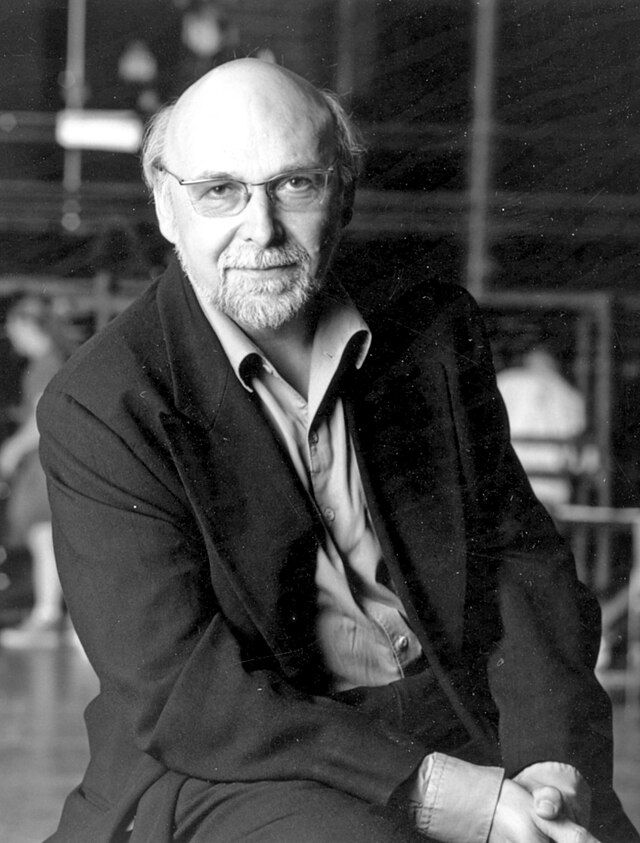Loading AI tools
From Wikipedia, the free encyclopedia
Jean-Louis Martinoty (20 January 1946 in Étampes – 27 January 2016 in Neuilly-sur-Seine) was a French writer and an opera director..[1][2] Renowned for his stagings of baroque operas in the eighties, he was also General Administrator of the Paris Opera (1986–1989).
You can help expand this article with text translated from the corresponding article in French. (December 2018) Click [show] for important translation instructions.
|

Jean-Louis Martinoty spent his childhood and his teens in Algeria where his father was a tax official. In 1961, his parents returned to France and settled in Nice. Martinoty studied classical letters and cello. He started his professional life as a French teacher for some years, then becoming a writer and music critic for the newspaper L'Humanité. In 1972, he interviewed the stage director Jean-Pierre Ponnelle, who invited him to come to the Salzburg Festival where he was preparing Mozart's The Marriage of Figaro. After replacing Ponnelle for a rehearsal he became his assistant and the writer of the scripts for most of his opera films (including La clemenza di Tito, Madama Butterfly and Carmina Burana). Martinoty made one film himself (Pasticcio from Haendel) and realized two documentaries about Italian mannerism. In 1992, he married Tamara Adloff.[3]
Jean-Louis Martinoty made his first staging in 1975 with Benjamin Britten's A Midsummer' s Night Dream at the Strasbourg Opera. It was followed by Offenbach's La Perichole. The Lyon Opera subsequently asked him to stage two Baroque operas whose music had been forgotten since more than two centuries, Cavalli's Ercole Amante (1979) and Charpentier's David et Jonathas (1981). Martinoty continued with numerous other Baroque productions. Among his more famous efforts are Monteverdi's L'incoronazione di Poppea (1982) with Jean-Claude Malgoire and Jean-Philippe Rameau's, Les Boreades at the Musical Festival of Aix-en-Provence with John Eliot Gardiner. This last opera, put on for the first time since 1770, obtained a striking success and the Lyric Grand Prix Review.[4] Some years later, Martinoty revived Lully's Alceste in a memorable production at the Théâtre des Champs-Elysées, next to Salieri'sTarare, Cesti's L'Argia and Gassmann's L'Opera Seria at the Schwetzingen Festival.
Inspired by his Baroque experiences Martinoty published the book Voyages à l'intérieur de l'opéra baroque, de Monteverdi à Mozart ('Travels inside Baroque opera, from Monteverdi to Mozart', 1990) in which ten opera works are analyzed on dramatic, scenographic and political levels.
His roughly one hundred stagings between 1975 and 2015 feature the whole opera repertory and were presented on both French and international stages : Richard Strauss's Ariadne auf Naxos at Covent Garden, Wagner's Der Ring des Nibelungen in Karlsruhe Festival (for which he designed the sets), Offenbach's Orpheus in the Underworld in the Paris Opera, Bizet's Carmen in Tokyo, Mozart's Don Giovanni in the Wiener Staatsoper,[5] etc. He also made an excursion into the Viennese operetta with Franz Lehár's The Merry Widow and Johan Strauss's The Gipsy Baron at the Zurich Opera under the musical direction of Nikolaus Harnoncourt, and even musical comedy with The Little Prince (Casino de Paris, 2002), based on Saint-Exupery's novel with new music by Richard Cocciante.
Martinoty's strong acting direction, his erudite stagings [6] in regular collaboration with the Austrian decorator Hans Schavernoch and the costume designer Daniel Ogier, were applauded most of the time, such his production Mozart's The Marriage of Figaro which received again Grand Prix of the best lyric production.[7] Created in the Champs-Elysées Theater in 2001, it was three times taken back during the following seven seasons, then in the Wiener Staatsoper where it entered the directory. In contrast, Gounod's Faust at the Bastille Opera in 2011 with Roberto Alagna in the title role was the object of a salvo of negative criticisms, in particular because of the loaded decoration and of his direction considered too "kitsch".[8]
He made a remarked come-back in 2012 with Verdi's Macbeth at the Bordeaux National Opera. This production was his last staging. Jean-Louis Martinoty died from the complications of heart surgery in a hospital in Neuilly-sur-Seine. He was just seventy. Fleur Pellerin, Minister of Culture and Communication, honored him in a press release : "...The Opera world is mourning the death of one who was revealed very early as one of the best directors of his generation ... He was also one of the great administrators of the Paris opera, at the same time guardian of the lyrical tradition and visionary open to modernity [...] He was one of those directors whose art is to remain totally at the service of music's great pieces, giving us totally to see to allow us to better hear them..." .[9] In October 2017, his friend Jean Ristat published a long elegiac poem about his disappearance, Éloge Funèbre de Monsieur Martinoty ('Funeral Praise of Mr Martinoty').
Jean-Louis Martinoty is buried at the cemetery of Joiselle, a village in the Marne department where he lived for forty-five years.
Jean-Louis Martinoty has been General Administrator of the Paris Opera from 1986 to 1989. Appointed to the general surprise on the 12 February 1986 after the resignation of his predecessor, the Italian Massimo Bogianckino elected Florence's mayor, he must have led the house in the very tense context before the opening of Bastille Opera House, characterized by internal battles and significant budget problems.[10][11]
Passionned by contemporary art, he innovated however many times during his mandate:
Seamless Wikipedia browsing. On steroids.
Every time you click a link to Wikipedia, Wiktionary or Wikiquote in your browser's search results, it will show the modern Wikiwand interface.
Wikiwand extension is a five stars, simple, with minimum permission required to keep your browsing private, safe and transparent.